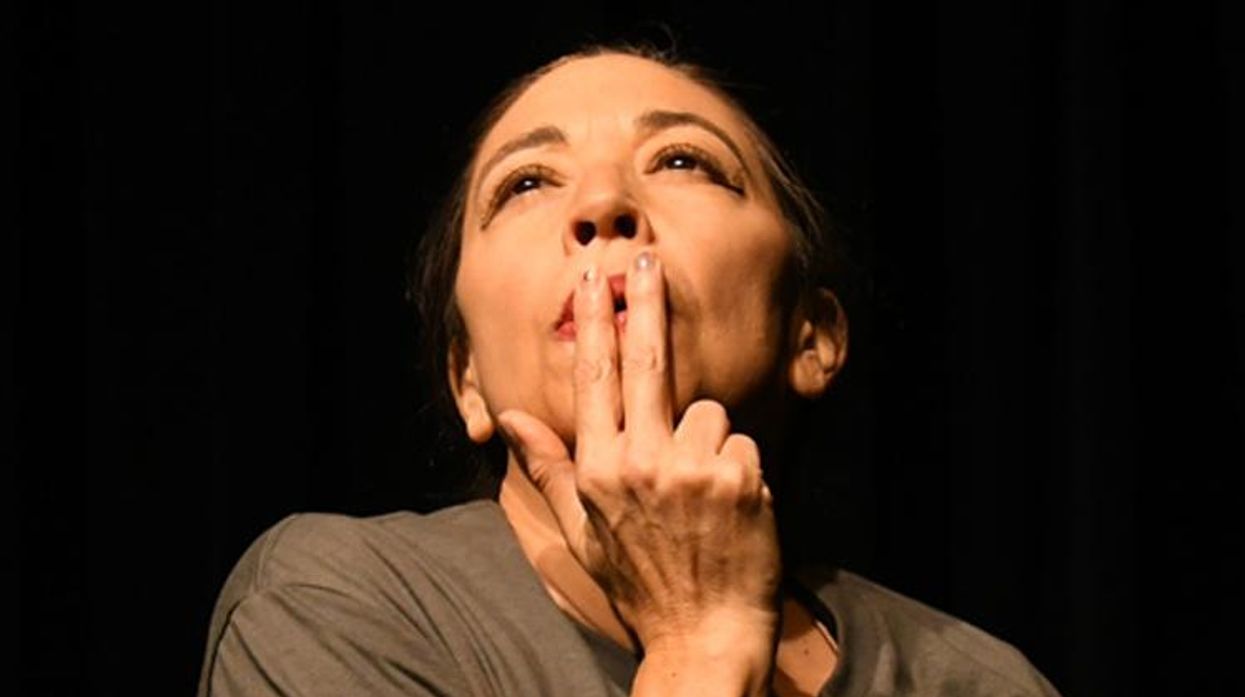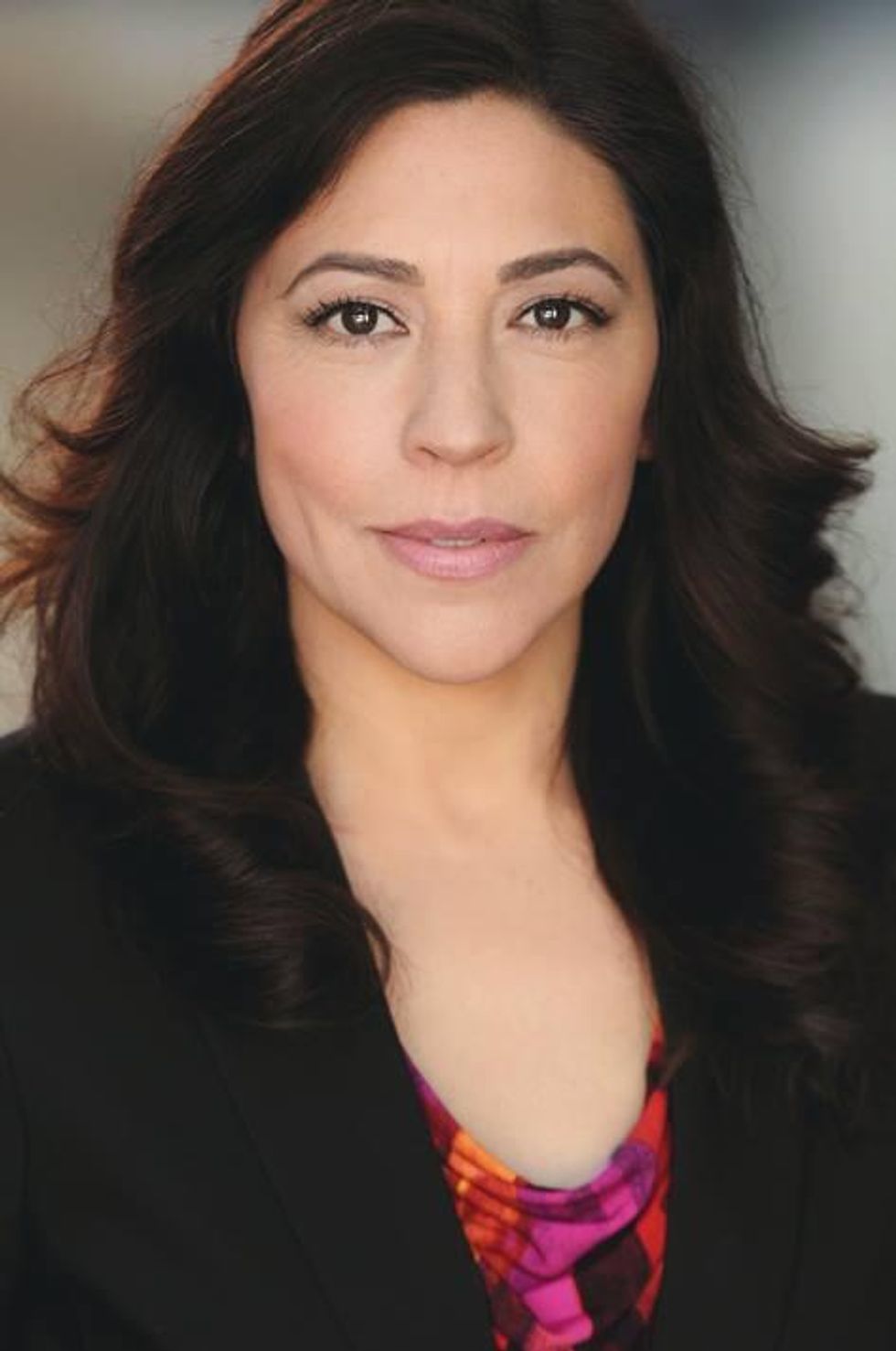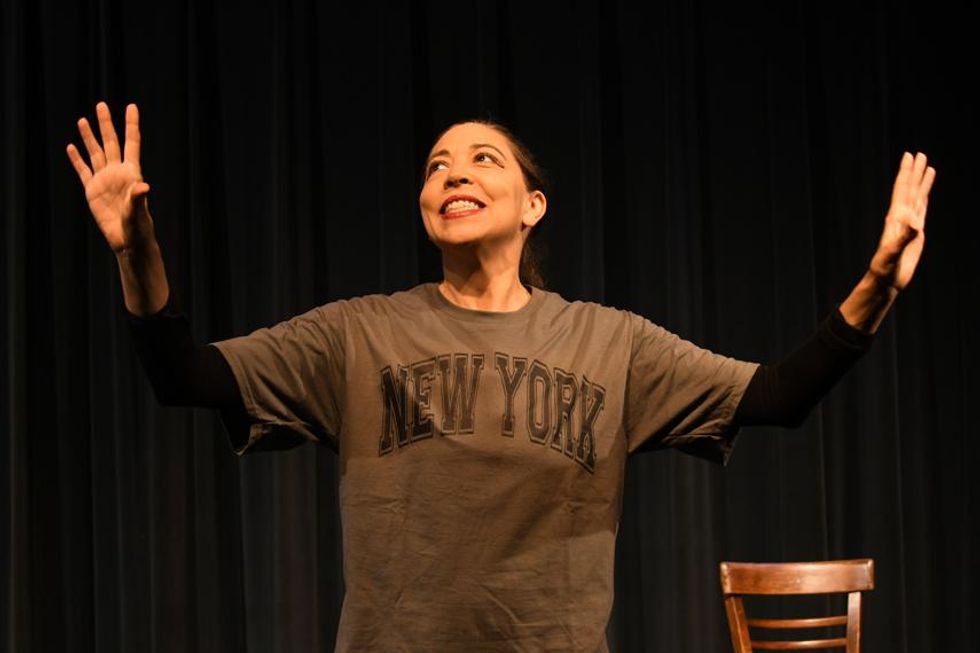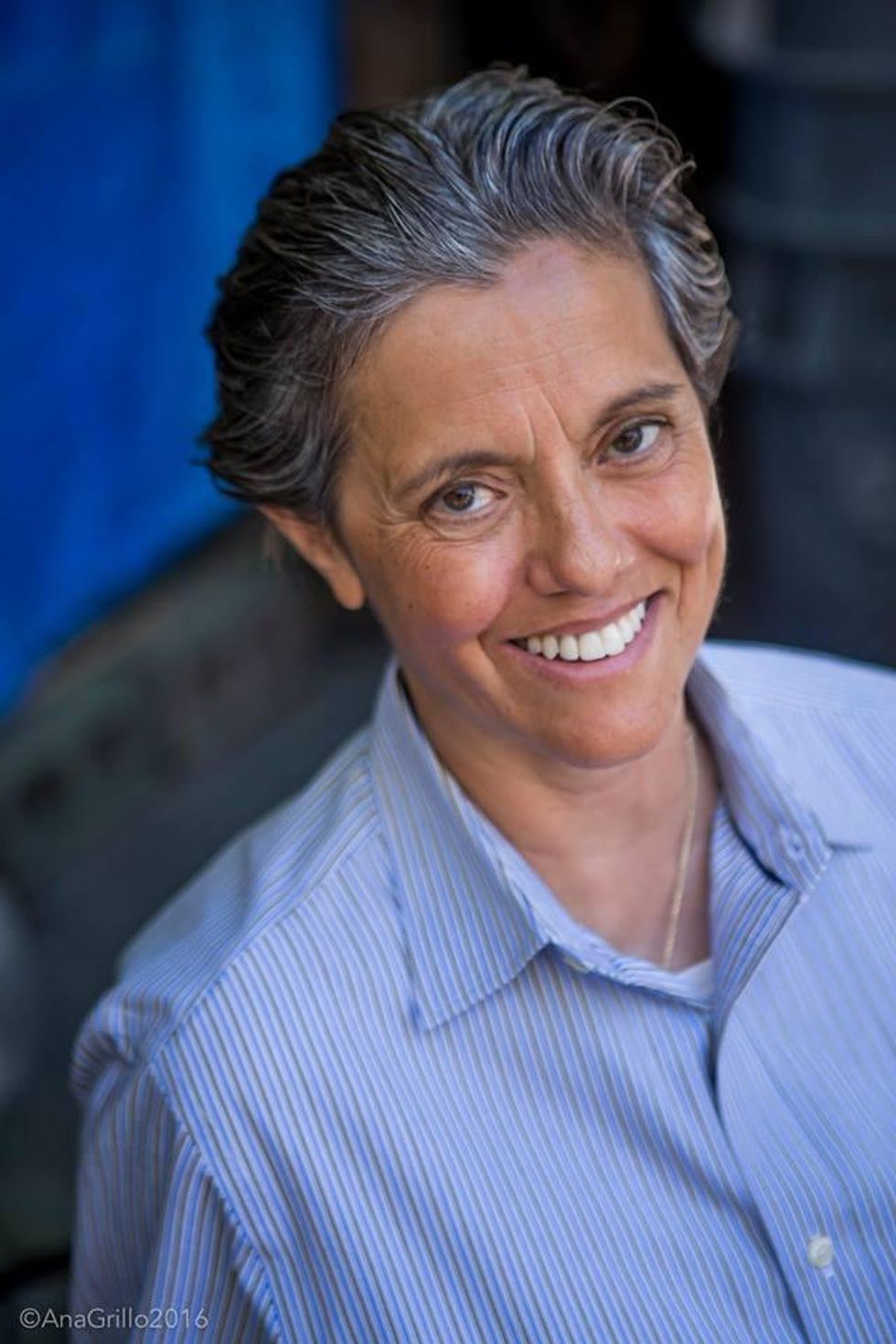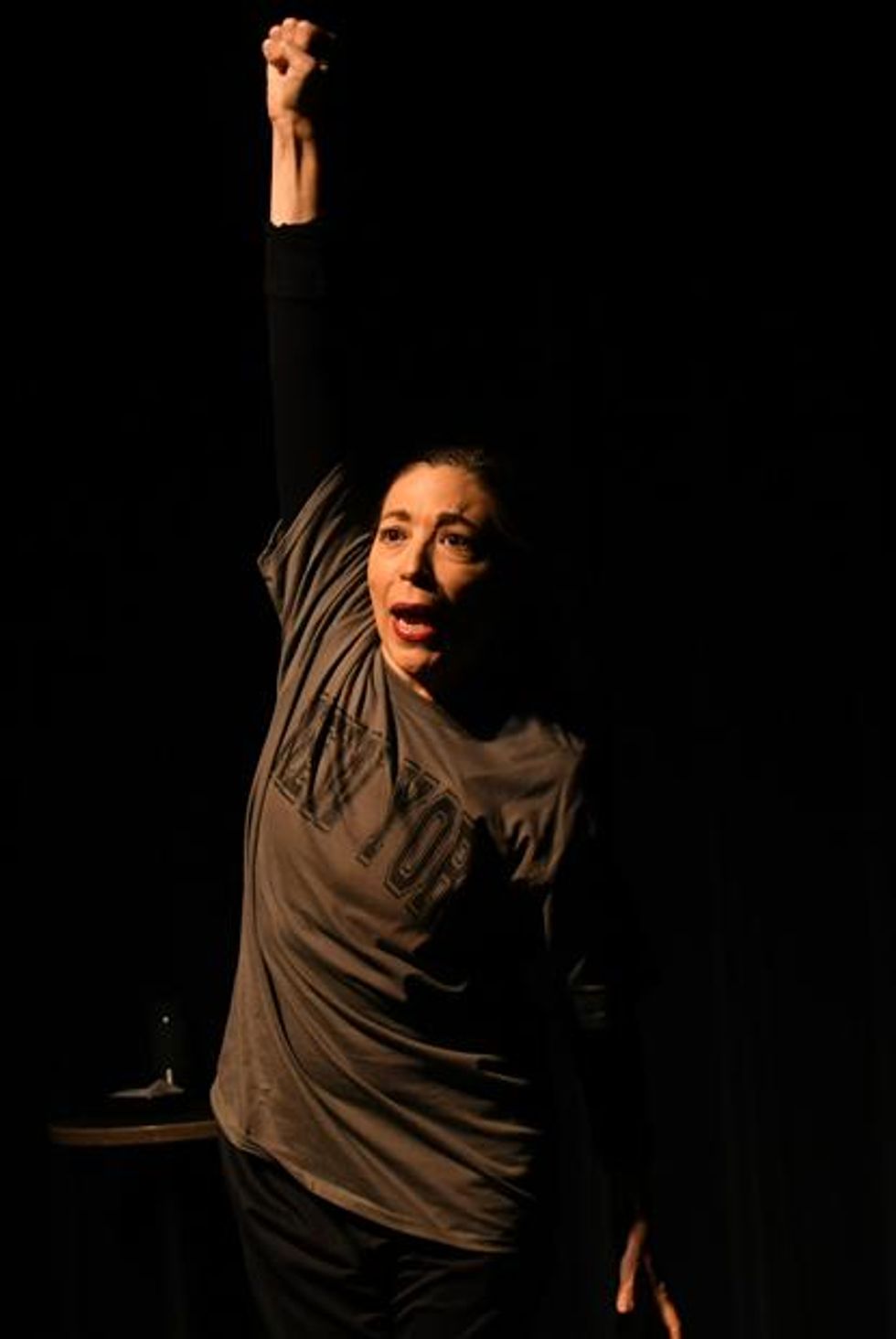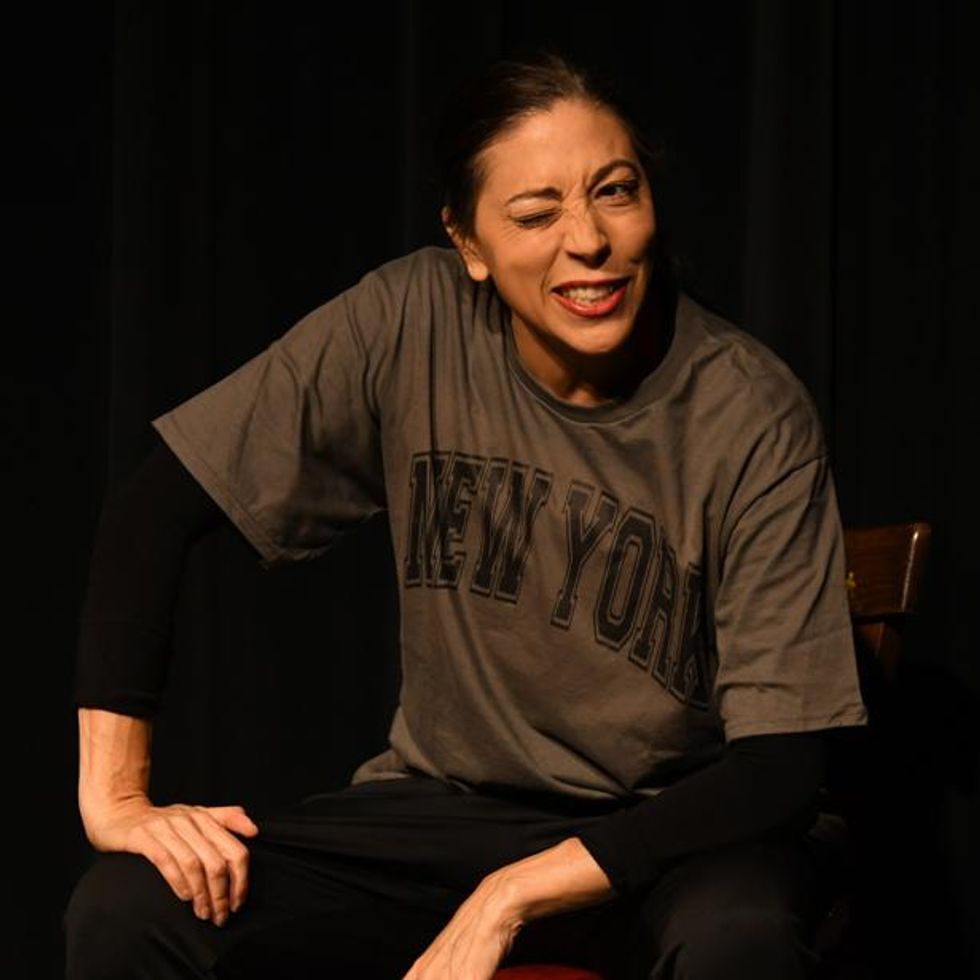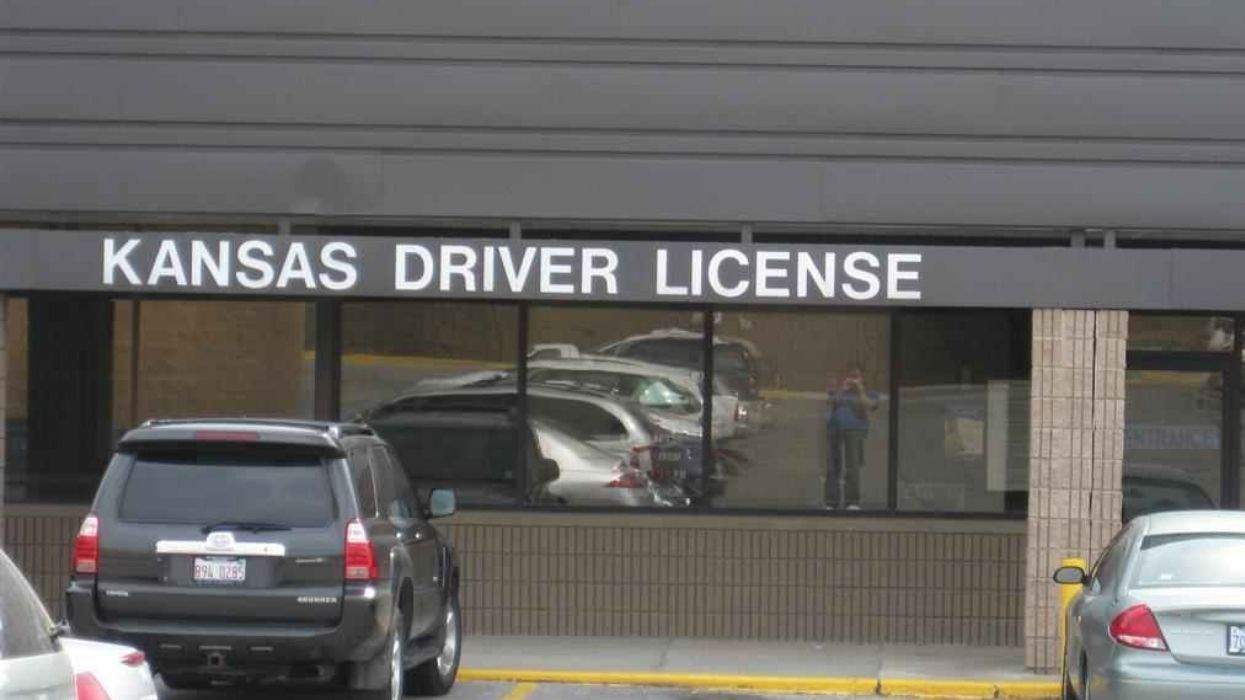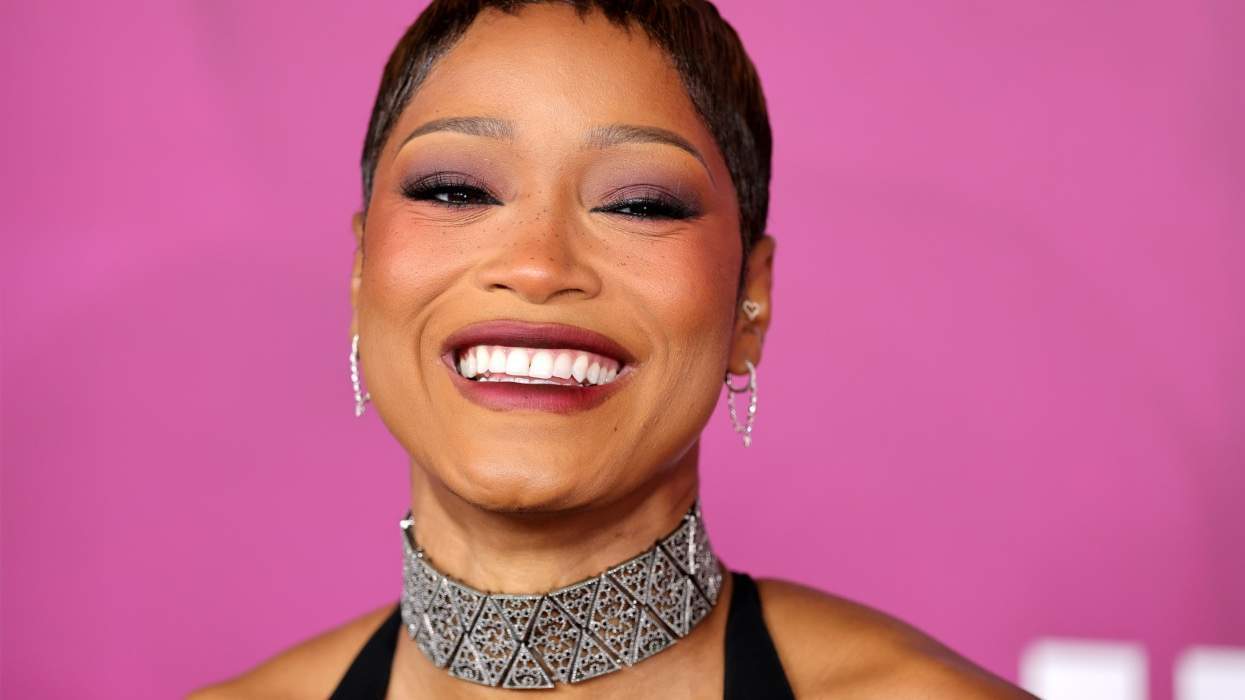Overlooked Latinas, written and performed by Tina D'Elia and directed by Mary Guzman, has been described as the "queer telenovela farce of our century." Playing at the Marsh in San Francisco, the story follows queer Latina best friends Carla and Angel as they try to get their TV show about yesteryear Latinx icons produced for a major network --and the headaches, high jinks, and highlights that follow.
The Advocate: So, the most important question is, what inspired the story?
Tina D'Elia: Yes, a couple of things inspired the story. I mean, one was the research I was doing about the impact of the McCarthy era on Latinx artists ... directly impacting Dolores del Rio and Rosaura Revueltas more in an obvious way because they were blacklisted and they were deported.
But then also during the McCarthy era and the Red Scare, there was a blacklist that really blacklisted many artists of color that we never really hear about. We hear more about the Hollywood 10. We hear more about white artists. If you go to a lot of the history, you may see Langston Hughes, Lena Horne, Richard Wright, and some other folks.
But I want I wanted to really bring our history out because the past and the present are always connected. History always repeats itself. We always find our way back to, you know, how are we being censored or ignored, how our stories being taken from us, how we're not telling our own stories, and also whether we're being whitewashed as characters or work that we're doing as Latinx folks from our past or present, but also queer people as well, and so Dolores del Rio being bisexual and Ramon Navarro being gay, I really wanted to, you know, really bring that history out. And so even though some of these people are stars, the irony in Overlooked Latinas is that it was really like, in essence, the humanity of people was being incredibly overlooked. And there were many ripples to the backlash of what was happening to folks like [in] Salt of the Earth had so much horrible racism and misogyny that was happening to people. ... That film was so powerful and it was being banned and blacklisted did that [an] actual migrant labor organizing place was set on fire very close to where the set was happening. And so for me, one, it's really impactful to sort of bring that out in the show and portray these stars.
The other thing about Overlooked Latinas is this is a way to sort of have this ... get your attention, like, you know, who's being overlooked in creating these characters that typically, you know [get overlooked], a butch dyke from Staten Island who's Puerto Rican and Italian and her best friend, Carla Garcia, and that's nonbinary and also Puerto Rican and Italian, both working-class, and how they really wanted to own their story and bring it forward. And you know, so the one deal they made was they would have Rita Hayworth be a star because, of course, because the major producer of a studio said, "You know, there's got to be Rita Hayworth and then I'll buy into this."
And I also wanted to bring joy, because in our very difficult political times, that are really rough, I always try to set the fiction of the characters in the future, bringing hope. So they're telling a story of the past, their television pilot, whereas Carla and Angel are trying to say there's going to be something better that happens in 2023.
It gets better.
Tina D'Elia: Yes, it gets better. So, typically they would be overlooked. Yet the three of us are not overlooked, because we're here.
Yeah, I love it. I love it. So just as a side note, I actually happened to have a very good friend who is Puerto Rican and Italian and a Staten Island butch. So that's not at all a far reach.
Tina D'Elia: That's great. That's awesome.
And this is the sort of thing that she and probably a whole lot of my peers here on Staten Island would actually want to not just see but also feel. ... So now the next question is, Mary, what brought you to the project? Did you say, "I have to do this"? Did she hit you over the head, or bribe you with...?
Mary Guzman: [Laughs] No, no, no, none of that. I'm a theater director and a filmmaker. And so I've made a bunch of films and Tina's been in a couple of them. We've known each other because I've always said she was great, and then we were just kind of getting in the same circles, you know, showing up in the same places.
So I was just all "We'll put Tina in it...Tina will do it." And when she started doing [a show as] Groucho Marx, she had another director. But every time I'd watch the show, I'd be like, "Oh, I want to be the director." ... I was constantly like, "He's not getting that, he should be better," right, I was all up in on it, but I never said anything. I never said anything until he stepped aside. And then I jumped on it like a, I don't know -- a jackrabbit. It I guess it because I was so thrilled ... because I knew [that even with] what little I saw of her ability that she would be so great to do this and so great to be able to play with somebody that you can say, "Put your hand here and not here in this role, because it makes a difference," and that she understands it makes a difference in her hands here instead of her hands here.
And so it's been I mean, we've been working together on and off for 18 years, right?
Tina D'Elia: Yep. Eighteen years. Yeah. And then the Rita show.
Mary Guzman: And the Rita show was so much fun to do because ... it was like a car crash at certain points. Rita Hayworth running around. Everybody else is running around there. But what [Tina] does, it's so incredible as you can follow everybody. You follow everybody. I don't know how many people after the show [came up to me] and they said, "I saw everybody onstage." So everybody in the audience knows where everybody is, who everybody is, and what they're doing. It's incredible. I've never seen anybody do that before, ever."
Tina D'Elia: So ... so I didn't hit Mary over the head.
Well, I think you bowled her over with your ability.
Tina D'Elia: Yes. And once we were already on the show that's the prequel to Overlooked Latinas, it's like once we were already on the ride, we kept going, yeah.
I love it. So what's next? So do you want to do you want to bring the show on the road, so to speak? I know you have upcoming dates. It's important [to me] that our voices as women and as Latinas and as lesbians and queer women be amplified. And I am lucky enough to have the freedom to start promoting that in a big way. Additionally, as much as I loved Hamilton and I did ... it wasn't queer and although it still had a BIPOC cast, it's not women-centered, and it's still about a white guy, no matter how many people of color you put in the roles, it's still a white man story. I've heard those stories. You heard those stories. I'm a little tired of those stories.
Tina D'Elia: Right, yeah.
I want to see our stories.
Tina D'Elia: Yes. Yay. Which is phenomenal. Yes, I will be I will be seeing what can happen with Overlooked Latinas on the East Coast, hopefully in New York next year, so we'll see what happens. What's in on the books is the longest- running gay theater, Theater Rhinoceros in San Francisco, which is great, is producing The Rita Hayworth of This Generation in April, which is very exciting because Mary and I, we won the Fringe in 2015 for the Rita show, San Francisco Fringe [Festival]. So it will be in the Castro in April and the Overlooked Latinas will come to San Leandro in May of 2023. ... Being an East Coast person myself from Boston, the plan has always been, you know, this is where Angel and Carla the two leads are from ... from Staten Island, pick Staten Island of all places.
Being that I grew up on Staten Island, what inspired that?
Tina D'Elia: Yes. Well, I had a dear, dear friend, Jeanine, who when I was in college, she was just so proud, this queer Puerto Rican. And so I remember being we were on a women's stage program ... at the time they were they were out Puerto Rican. So I was inspired by an actual person, a friend, and I was so inspired because I had never met somebody that was just like, they literally like "Staten Island in the house -- woo-hoo!" you know, and ... I think we would usually see that [in] like a women's studies queer trip, you know, in 1990, riot grrrl, punk, hip-hop -- like all these things happening, zines, music, you know, really early film for us [the queer community]. So it's all this stuff.
There I was going to school in the Midwest and Earlham College, and while I was familiar with folks from like Bronx, Brooklyn, maybe Queens, I don't think I'd ever met someone who is such a -- for me, coming from Boston and going to school in the Midwest -- meeting somebody who was the most outspoken Puerto Rican, brown, like, fierce young woman who's queer, as my friend is, so she made such an impression that that's why when I created Angel. I was like, Angel kind of feels like my friend.
I got to go off and make a fictional character who self-identifies as a butch and is her own person. And usually that's what I do -- whenever I'm inspired to work on a character, even if they're based on someone who is real, my goal as a solo performer is to figure out what inspired me to create them because it came from a real place of love or a real moment of humanity, but to make them their own person, right? I'm never trying to make the copy of somebody. I think that's a really different kind of craft. If I spend years developing a character, then like there's somebody that's inside of me, if that makes any sense. So it's not like taking an actual person and trying to put them in me. It's like I'm trying to create somebody and then they're in me so long that then they just start talking. So [when] Mary asked me a question as a director or David Ford asks a question as a dramaturge in class ... I answer as the character. I don't hesitate and it doesn't even matter. Like I would not if somebody thought I was nuts. This is who I am.
OK, so we have upcoming performances and we have the prequel coming up as well. So are there thoughts to ... maybe an adjunct to the storyline?
Tina D'Elia: Yes. What I have always had a vision of that Mary helped me with is ... a pilot script that Mary helped me with ... that I've submitted. ... And that's a really different way to tell a story because I'm not telling a story as a solo performer, and as a casting director, I'm not casting myself in most of the roles.
I'm trying to tell a story really differently, but there's a different intention. So I wrote a whole separate role for myself on the side because I really have an intention. ... I see a TV series I want to help write it. I see different people directing it. I see me casting with a lot of actors that I can have be a part of it. So, and whether it's called Overlooked Latinas or something else, so that's sort of the next stage.
And I don't know if I could ever create a next thing to this, but of a solo show. But I'm so so hooked on wanting to have a TV series where the present-day queer-centered characters are trying to keep telling stories of our past, because that's how we can tell stories of our past, is having a TV series, you know, whether it's on a platform that we're always going back and trying to tell these stories, you know, and if it is a series, then we can tell more stories about artists that are that have been overlooked and also how they're told, like there are a lot of times that even if like somebody's playing a Frida Kahlo or Diego Rivera for a moment is still a one-note, like we're never really, you know -- I'm still shocked that one time I saw Dolores del Rio and she was played by a white actress -- you know, it still is ... I'm like I like, wow --what was that?
I was like, wow, we have ... we have a lot. We have a lot to do. And I also see it as a great way to actually hire a team of a lot of next people to keep, you know, to build a series. So that's sort of the next idea. Our next solo show that we'll work on is The Breakup: A Queer Latina Torch Song.
So yes. So it will take a couple of years since I have to be onstage with Rita and then I have to go to Overlooked next year. I will I will keep working on the breakup show so that it's on the stage with me at that.
What do you see? What do you envision in terms of the future, not just in terms of this project, but other projects and perhaps even just theater and media in general, and for our storytelling? Everybody else's storytelling -- they've got movies that they're going to make millions. What are we doing?
Mary Guzman: I have a feature film ... that I've been working on for a very long time. I was about to get it, you know, moving into production, but then the pandemic hit and then it's taken me a long while to get back to it. So that's my thing. It's a feature film. It's all women of color. It's in the middle of Lancaster, Calif.
Tina D'Elia: And the lead is a queer Latina.
Mary Guzman: And the lead is a queer Latina. And a lot of them are queer Latinas, in the group.
